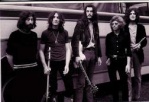Playlist
INTERVIEW de GREG SMITH (logistics manager of Supertramp 1979-1988)
Page 1 sur 1
 INTERVIEW de GREG SMITH (logistics manager of Supertramp 1979-1988)
INTERVIEW de GREG SMITH (logistics manager of Supertramp 1979-1988)
INTERVIEW WITH GREG SMITH
By ABEL FUENTES
Posted on THE LOGICAL WEB
August 2011
QUESTION: When and where were you born?
GREG: I was born New Year's Eve 1954, Long Beach, California.
QUESTION: According to my notes, you worked as the Supertramp logistics manager for almost a decade… Is it right?
GREG: Yes, I worked with the band from 1979 to 1988. I was the only American on the band's full time payroll for this time period.
QUESTION: What did your work involve exactly?
GREG: For the tours, with the support of our security staff I handled the transportation of the band and entourage. This consisted of arranging travel from their home to the airport, airport to hotel, and hotel to venue, venue to hotel or airport and back home. I coordinated all of the band and entourage personal luggage logistics with the airlines and hotel staff.
QUESTION: What were your tasks at the venues?
GREG: At the venues I was responsible for the dressing room and hospitality suite carnet insuring that each and all of the band member's personal needs were addressed and provided by the concert promoter. I was also responsible for the performance wardrobe storage, maintenance and cleaning.
QUESTION: Did you have any responsibility on stage?
GREG: On stage I was responsible for providing and insuring that each band member had their beverages and cigarettes of choice towels to dry the perspiration resulting from their performance in the lights. During the concert performance I usually had a role as a convict character in "Fools overture" or the paranoid American in "Brother where you bound" and I played the roof top sunbather under the trademark yellow umbrella from "Crisis? What crisis?"
QUESTION: How did you spend your time when the band was not touring?
GREG: When the band was off tour and in the recording studio I worked as a studio technician with Ian Lloyd-Bisley, Norman Hall, Pete Henderson and Russel Pope, building sound baffles, setting up instruments, repairing, procuring electronic components and equipment used for the recording, stocking the studio with all of the beverages and food snacks desired. I also provided technical support for the band member's personal audio visual recording and play back systems at their homes.
QUESTION: How did you start to work in music business?
GREG: In 1976 I was hired at A&M Records in Hollywood, California. Three years later I was part of a team that was promoting the "Breakfast in America" album to radio stations. We developed a package promotion called "Supertramp: The Collected Works" consisting of the complete recording catalogue to date.
QUESTION: How did you join Supertramp after that work?
GREG: The summer of 1979 Herb Alpert's (the "A" of A&M Records) nephew Derrick Alpert needed a job. He chose mine so I was laid off. Charly Prevost and Dave Margereson of Mismanagement, Supertramp's management company offered me a position as band's assistant on the "Breakfast in America" European tour. I was introduced to the band members and the rest is history.
QUESTION: Had you been working for other bands before joining Supertramp?
GREG: Prior to this I had done some work for Pablo Cruise, The Tubes, Styx, Herb Alpert and The Carpenters but as an employee of A&M Records.
QUESTION: Why did you stop working with Supertramp?
GREG: My last work with Supertramp was the Hollywood Festival in Sao Paolo and Rio De Janeiro, Brazil 1988. Sue Davies (Rick's wife), then the band's manager, had placed me in charge of the band members' travel for this leg of concerts. She was going to meet me at the airline check in counter prior to our departure. I was tasked with picking up Bob Siebenberg from another incoming flight and delivering him to our flight to Brazil. Bob's flight was late and the traffic was jammed at LAX, so getting to our terminal on time required me to drive over center road medians and on pedestrian paths to arrive on time putting my life and my family (wife and son) and Bob's life at risk.
QUESTION: What happened after that?
GREG: When Bob and I arrived at the ticket counter in time Sue was very angry because I was late and did not do the check in. She told me I should have left Bob to make his own way so she would not have to do my job. She "dressed me down" in front of the band and entourage creating a very embarrassing scene for all. I crossed over the ticket counter and pulled my luggage from the conveyer belt and told the band I was done. They begged me to reconsider and Sue apologized. But I knew this was the finish for me. I did the shows in Brazil and that was it.
QUESTION: What have you been working on since then?
GREG: Upon return from the "Famous last words" tour my wife Kary and I conceived a child and since 1984 and the birth of my only son Quinn my priorities had changed. I became a partner in a lighting company that provides lighting equipment to the entertainment industry, aerospace, NASA and architectural installations. I was able to make a transition from Supertramp to Arc Lighting in the years 1986 to 1988. Then I created a special effects company Arc Efx and I bought out all of my remaining partners and became the sole owner of Arc Lighting and Arc Light Efx. In 1998 I was offered a buyout and employment at Xenotech and became vice president of Xenotech Strong, vice president of Strong Entertainment Lighting and finally general manager of Xenotech Strong. In 2002 I purchased Xenotech and changed the business name to Arc Light Efx. We are still a very successful business today.
QUESTION: What was your best moment with Supertramp?
GREG: I felt I was part of the best prize in the world when I was out in Europe on the "Breakfast in America" tour.
QUESTION: And the worst one?
GREG: The worst moment was the flight home at the tours completion because I thought I would never top that experience again in my lifetime and I knew that Roger Hodgson and Rick Davies were not on the same wavelength anymore.
QUESTION: Do you remember anything special from your visits to Spain?
GREG: Political protest were taking place during our stay in Madrid and our hotel was very close to one of the protest that was taking place in the streets. As I went out to view the protest a crowd was being disbursed by the police on horseback and they were charging and running right for me. I started to run myself for safety but then I pulled out my Supertramp tour pass and flashed it to the Police and they just road past me on the horses not inflicting any blows or injury. Barcelona and San Sebastian are my two favourite places. I love paella! We had lots of paella for our meals.
QUESTION: What is, in your opinion, the reason why Supertramp broke up in 1983, when the band was so successful?
GREG: As I reflect in retrospect to the success of the band in the 70's and 80's I would attribute it to the desire, experience, hunger, ambition, sacrifice, trust, honour and talent of a collective group of people who became friends then family. The band in my opinion truly broke up after the "Breakfast in America" tour.
QUESTION: Why?
GREG: The strain and lack of harmony between Rick and Roger during the recording of "Famous last words" was very difficult for all involved. As success became evident greed and a lack of trust intensified adding other "outside advisers" becoming a fracturing spirit, splitting the creative energy that was force behind the magic. This changed the mood of the music to a dark personal tone.
QUESTION: Did you notice many changes in the band after Roger Hodgson left?
GREG: After Roger left the band and after the "Famous last words" tour the magic and spirit of the music had changed. The battle that ensued for the management and direction of the music went into a dark political direction in my opinion and became more of a challenge for me to relate to. I found the expectations and demands from management and band members to be more materialistic. I felt that I had become an enabler to the band members and management's excess and not to the art.
QUESTION: Have you followed the new band since 1997?
GREG: I have not followed the current status of Supertramp. On occasion I will see updates from Facebook. The politics of the split were the prime reasons for my moving on in my career. Being a survivor of a dysfunctional divorced family I was aware of the dominant personalities and the legal battles. My opinion of what is right or wrong was supported by my actions.
QUESTION: Where do you live now?
GREG: I still live on the edge. I have a small Lazy "S" Ranch in Leona Valley, California right on the western edge of the San Andreas Fault in North Los Angeles County.
QUESTION: Are you still in touch with some Supertramp members?
GREG: I saw Bob Siebenberg in 2009 but communications with the band have been few. My closest relations were with John Helliwell, Dougie Thomson and Bob Siebenberg.
QUESTION: Did you attend any Supertramp show during their recent "70-10" tour or any Roger Hodgson's solo show?
GREG: I haven't attended any recent performances by Supertramp nor have I seen any of Roger's solo concerts. I do miss the old Supertramp!
La femme de Rick en prend encore pour son grade décidément.


Celtic1981- Dreamer

- Messages : 1138
Date d'inscription : 17/03/2010
Age : 43
Localisation : Angoulême
 Sujets similaires
Sujets similaires» Interview de Rick Davies sur Supertramp et sa carrière
» Salut à tous
» SUPERTRAMP BERCY 18 Octobre 2010, vos impressions? (ATTENTION SPOILER)
» interview de BOB !
» interview de John !!!!!
» Salut à tous
» SUPERTRAMP BERCY 18 Octobre 2010, vos impressions? (ATTENTION SPOILER)
» interview de BOB !
» interview de John !!!!!
Page 1 sur 1
Permission de ce forum:
Vous ne pouvez pas répondre aux sujets dans ce forum|
|
|




